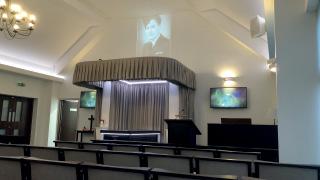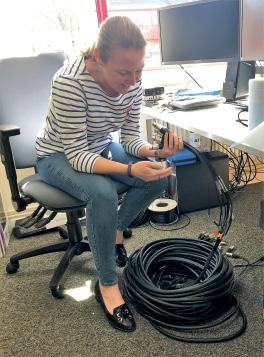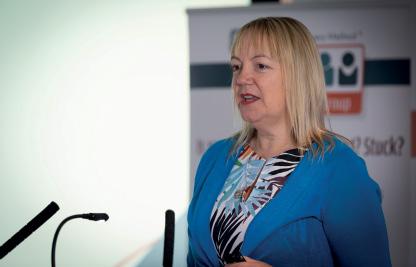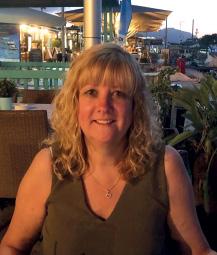The ICCM Journal | Summer 2020 | V88 No. 2
31
a funeral director’s perspective Jim Auld, SAIF past president reflects on current events On the weekend of 13th – 15th March I relinquished my term of office as President of SAIF: The National Society of Allied and Independent Funeral Directors. It was a privilege to represent SAIF during the last twelve months, particularly amongst the kindred professional associations and it was a pleasure to welcome your President Heather White to Glasgow. The weekend in Glasgow will, I think, be remembered by those who were there, as last weekend before lockdown. During my year, I felt that we as funeral directors do not interact enough with the cemeteries and crematoria we work with. I sometimes think funeral directors see the crematorium and cemetery staff as the enemy and vice versa. I really would like to see us working closer together because at the end of the day what is most important to both of us is the bereaved that entrust us to give their loved ones a caring and professional farewell and appropriate support. The last six weeks have been challenging to say the least for the whole country and as funeral directors we have been challenged, we have learnt to do what we do in an entirely different way than we have ever done before. It is alien for us not to see the families that we care for face to face. We have also had to change the services that we provide for families from the removal of limousines, the lack of face to face appointments, and the restriction of numbers attending the funeral to name just a few. However, our attitude and empathy towards families is still there, although in a different role. I own a small family business doing just less than two hundred funerals a year in a semi-rural community of around twenty-five thousand people, in the west of Scotland. At the start of the crisis I was the first funeral director locally to withdraw the provision of limousines. I immediately prepared a letter that we could hand to families if we were at a death in the community or email them about how our business was operating during this time, along with how cemeteries and crematoria were running locally as well. We also sent this letter to all our local clergy and celebrants so that we are basically all singing from the same hymn sheet. I firmly believe communicating clearly with the families at all times has been a great help to how we have coped. The registration of deaths procedure changed at the end of March with medical certificates of cause of death being emailed by the GP or the hospital, to the registrar. The registrars then contact the family and register the death over the telephone, sending the form 14 to the funeral director to pass on to the cemetery or crematorium electronically. This has been an important step and, in many ways, has eased the burden on the registration service. I remember well, January 2018, when we waited days for a registration appointment and I never thought we would have a month as busy as that ever again. Instead, registration is taking place so much quicker as the registrars are working from home and not relying on booking an office appointment in the council buildings. Last week, for example, we had a death in the community at 12 noon and by the time we brought the deceased into our care at 2:00pm the registrar had registered the death and the funeral was booked by 3:00pm.
It has really been about managing throughput. With only eight people attending our funerals locally, families are not having to wait on relatives to arrive from abroad to attend services, so funerals are actually taking place quicker than what they would in normal circumstances. Funerals have changed in themselves and are no longer the celebrations of life. They have become poignant occasions of farewell. One of the most poignant and personal funerals for me was a ninety-oneyear-old gentleman whom I had known for most of my life. His three children and their spouses were in the chapel, his grandchildren and their partners and his great grandchildren lined the street that he had lived in for over 60 years, as we drove by. I felt enormously privileged to take his coffin into the crematorium that morning but felt profoundly sad that his grandchildren weren’t there, and, in some ways, I felt I shouldn’t have been there. I have personally arranged in last week more funerals than an average month. I have arranged all the funerals myself over the phone and on the day of the funeral I have been there personally to meet the family, so that at least there is a feeling of continuity. I have read much on social media about the funeral sector being the forgotten people of this crisis. I don’t agree with this, the number of messages I have had from families I have looked after in the past saying they are thinking about me and my team and the staff at the crematorium or cemetery are going through, has been quite incredible. I don’t think we are forgotten. I also don’t do what I do for recognition, I do it because it is a vocation not a job and I feel I can make a difference. What I have been amazed at has been the acceptance of all my bereaved families of the restraints imposed on them and the concern for the crematorium and cemetery staff and us. I have found it truly humbling to see the public show respect to a hearse by pausing and bowing their heads as it passes and we personally have tried to choose an appropriate route to allow neighbours or friends the opportunity to remember at a social distance. We are all learning in this and there will be more changes as the weeks and months move forward but I know we, as funeral, cemetery and crematoria professionals will have given our all and more for the families we have looked after. It is our duty as funeral directors to keep everyone safe and support our cemetery and crematoria staff to keep funerals happening safely. As for the mental strain on us all I think that is an article for another issue and for another author. Stay safe and stay strong and we will meet again. Jim Auld


















